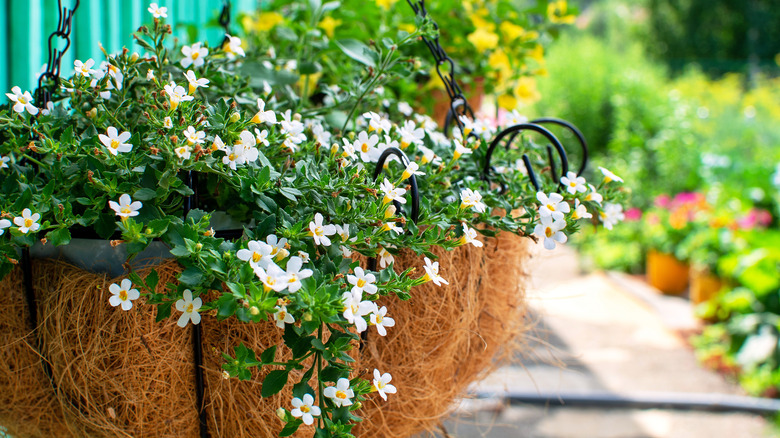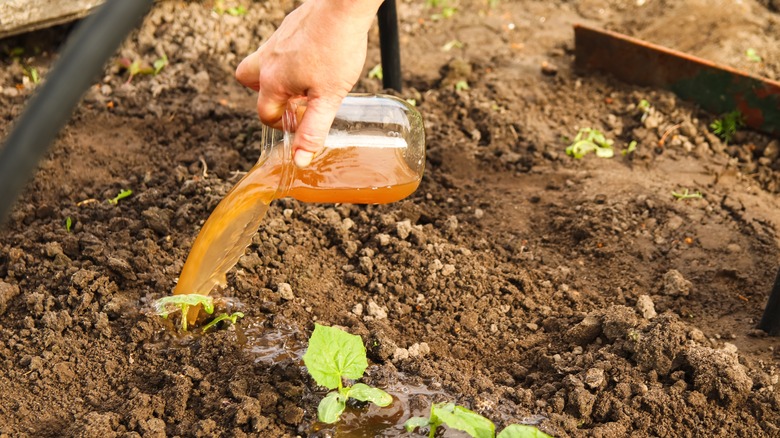Tips To Keep Your Bacopa Blooming All Season Long
Originating in subtropical environments, bacopa is a perennial plant with a trailing habit. It has lush, green foliage that cascades, making it a fantastic choice for hanging baskets. If you want to keep your bacopa blooming throughout the seasons, there are some key things to focus on, including frequent fertilization and optimal soil, light, and temperature conditions. Depending on the variety, you could be blessed with blossoms in shades ranging from pure white to lavender to vivid blue.
Timing is crucial for this bloomer — you'll want to plant it in early spring, just after the threat of the last frost has passed. Doing so gives you a head start for a season of abundant flowering. But hey, bacopa isn't just visually appealing; it also has a storied place in traditional medicine. Over the years, it has been used for various therapeutic purposes, making it as functional as it is beautiful.
What's particularly great about bacopa is its ability to thrive in various conditions. Whether you're an experienced gardening pro or a newbie still figuring out how not to kill a cactus, bacopa offers a wonderful introduction or addition to your green portfolio. However, and this is important, the plant won't flourish without your active involvement. It may be adaptable, but it's not invincible. You'll need to give it the attention and care it needs to sustain its floral splendor season after season.
The importance of frequent fertilization
Regular fertilization is one of the most effective strategies to maintain the health of your bacopa flowers. Like most plants, bacopa requires a continuous supply of nutrients to thrive. Consistent fertilization not only promotes beautiful blooms but also supports the growth of strong roots and stems, making the plant more resilient overall. Therefore, if you notice yellowing leaves or fewer blossoms, it is a clear indication that your bacopa urgently needs essential nutrients.
The recommended solution is to use a water-soluble, balanced 10-10-10 fertilizer in liquid form. The numbers in this code indicate that the fertilizer contains an equal mix of nitrogen (N), potassium (K), and phosphorus (P), each accounting for 10% of the total content. These three elements are the primary macronutrients that your plant requires. This balanced nutrient profile makes the fertilizer suitable for a wide range of plants, not just bacopa. Applying this fertilizer will enrich the soil, ensuring it has all the necessary nutrients to actively promote beautiful flowering in your bacopa.
The frequency of fertilization may vary depending on whether your bacopa is planted in a garden or a container. For garden-planted bacopa, aim to fertilize every two to three weeks. However, if your bacopa is in a container, it will benefit from more frequent fertilization. It is recommended to fertilize it once a week or every two weeks for optimal results.
Soil pH, light conditions, and temperature sensitivity
Bacopa is not too picky about soil type, but it does have a preferred pH range. Aim for moist soil with a pH between 5.6 and 5.9 to keep your bacopa plant happy. While it is not necessary to constantly monitor pH levels, it is a good idea to test the soil at the beginning of the growing season and make any necessary adjustments. In terms of light, bacopa has specific requirements. It thrives in the morning sunlight and afternoon shade. Look for a spot that replicates its natural habitat, with bright but not intense light conditions. Excessive direct sunlight can dry out the plant, so a bit of afternoon shade is often beneficial.
Bacopa is also sensitive to extreme temperatures, especially excessive heat. When the temperature rises, the plant stops flowering. This is something to consider when choosing a location for your bacopa, particularly if you live in an area with very hot summers. Providing some relief from the afternoon sun can greatly extend the flowering period. As you become more familiar with the bacopa plant's specific needs and behaviors, it will be easier to provide the right care, resulting in a stunning display of blooms that lasts all season long.


